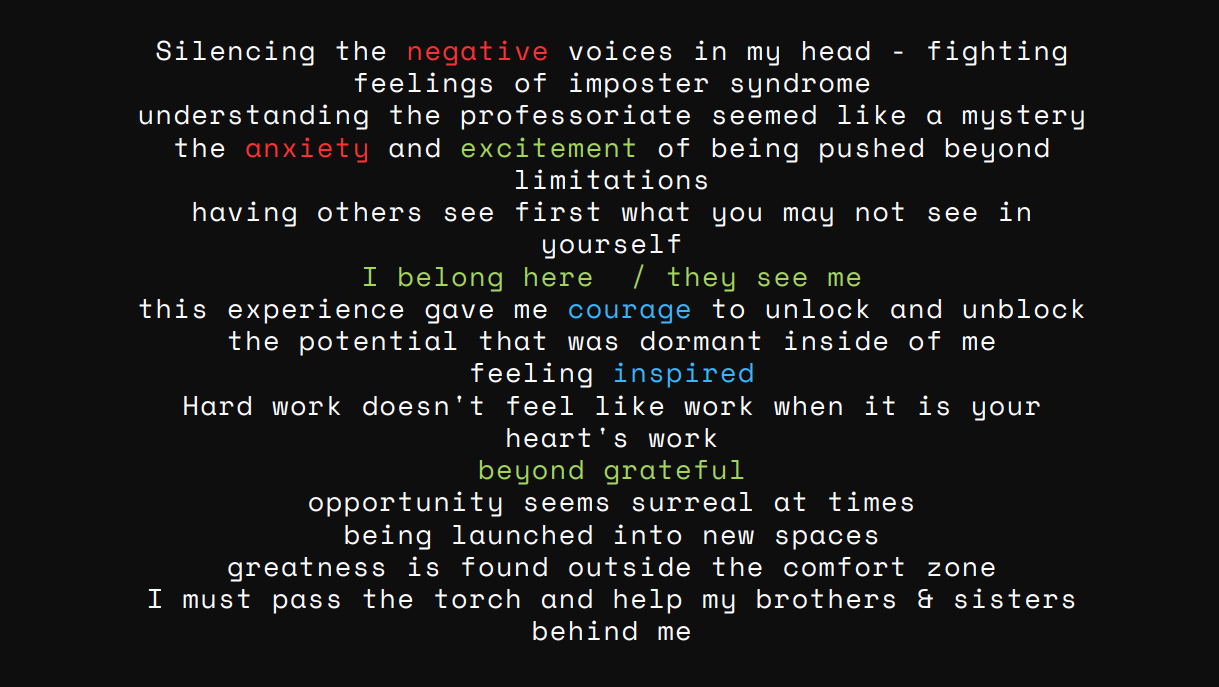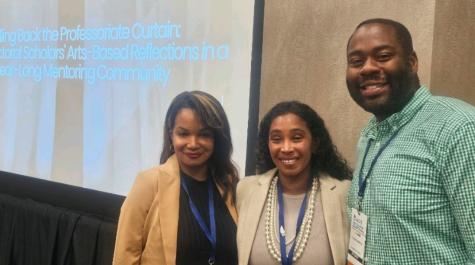A William & Mary Holmes Scholar reflects on a valuable mentorship opportunity
After a competitive application process, Darla Edwards Ed.D. '25, a student in the EPPL K-12 Administration doctoral program was selected for the inaugural Journal of Teacher Education (JTE) mentorship cohort, part of the American Association of Colleges for Teacher Education (AACTE) Holmes Scholars Program. The nominated cohort worked together to write an editorial for a special 2024 anniversary issue of the journal. The team presented their research and mentorship reflections at the 2024 AACTE conference.
With a mission to cultivate mentorship and enhance the professional development of graduate students of color, the AACTE Holmes Scholars program led Edwards to this opportunity with the JTE. While attending the 2023 AACTE Preconference with other William & Mary Holmes Scholars, Edwards went to a breakout session led by Valerie Hill-Jackson Ph.D., co-editor of the JTE and assistant professor at Texas A&M, where she learned about the mentorship opportunity and its involvement with the journal’s 75th anniversary issue.
With a goal of modernizing teacher education while supporting pre-service and in-service teachers, the special issue would focus on three areas: Teacher Education, the Future of Education, and Family Engagement. In AACTE’s award announcement, Edwards is recognized as “a passionate advocate for family engagement.” Given her passion for family engagement and the goal of the anniversary issue, Edwards was encouraged to apply with the understanding that upon completion of the mentorship program, the cohort would then present their findings at the 2024 AACTE conference.
Edwards was joined by two other cohort members, Tahnee Wilder, University of Central Florida, and John Samuels, University of Florida. Each of them focused on one of the three anniversary areas and had a team of co-editors. During the mentorship, the cohort kept reflective journals to highlight their experiences, reflections and challenges with the program.
Along with her current professional and academic engagements, Edwards became busy working alongside her JTE mentorship cohort. Although the opportunity was a major commitment, the cohort remained loyal to their goal: learning about the peer-review and publishing processes. For Edwards and other academic professionals across the world, the opportunity to be published in the JTE is a professional goal and highly esteemed honor.
The cohort members became close throughout their year-long process. According to Edwards, the group took time to connect before their meetings and got to know each other on a personal level.
“We were looking forward to the times we would meet on Zoom,” she says. “With us, it didn’t feel like work because it was something we were all passionate about.”
As preparations for the AACTE conference presentation were being finalized, Samuels pitched an artistic approach. The group agreed to use arts-based research methodology, which places art as the center focus when analyzing research.
The presentation, “Pulling Back the Professoriate Curtain: Black Doctoral Scholars’ Arts-Based Reflections in a Year-Long Mentoring Community,” gathered experiences from each of the members reflective journals throughout the year-long mentorship process, resulting in a poem. Each cohort member took emotional excerpts from their journals and categorized those emotions into overall themes relating to their mentorship and research topics. The various emotions emphasized throughout the poetic stanzas were seamlessly connected to their research findings in these areas: challenges faced by minorities in higher education, related models and higher education capitals.
Although the journal excerpts were written individually, the presentation was cohesive. Each member of the cohort shared their stanza, what it meant to them, and how it related to their experiences in the mentorship opportunity.

The presentation led to powerful discoveries for Edwards. She was coached throughout the publishing process by working with co-editors of the journal who are experts in their fields. And although she originally described the process as an enigma, she has now developed the confidence to pursue future publishing opportunities.
Upon reflection, Edwards attributes her success to William & Mary:
“There are so many other opportunities that can open up just from having the opportunity to be in this cohort, and I credit it all back to William & Mary,” says Edwards. “I never would’ve learned about it or had the opportunity if it hadn’t been for the program at William & Mary. That’s why I’m such an advocate for the Holmes Scholars program.” She also credits her faculty mentors for guiding her on this path.
“My William & Mary mentors catapulted me to this experience” Edwards continues. “Thanks to Dr. Stephanie Blackmon, the Holmes Program, Dr. Peggy Constantino and Dr. Steve Constantino, the experts in the field of Family Engagement. Also to my mentors who have supported my professional growth, Dr. Grant and Dr. McLaughlin.”
The cohort’s poetic reflections displayed the highlights and frustrations from the 2024 mentorship process, as well as ways to grow the mentorship for the coming years, and Edwards and her team hope to continue their involvement. The group looks forward to potentially becoming mentors for the 2025 JTE mentorship cohort and has been invited by the AACTE to do a virtual presentation of this session on April 24.
